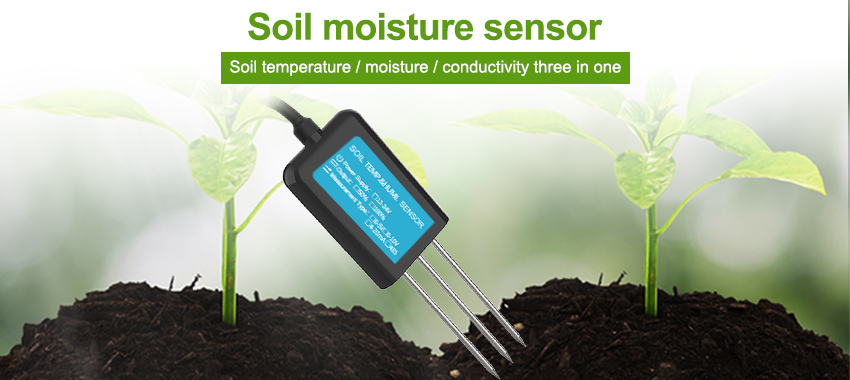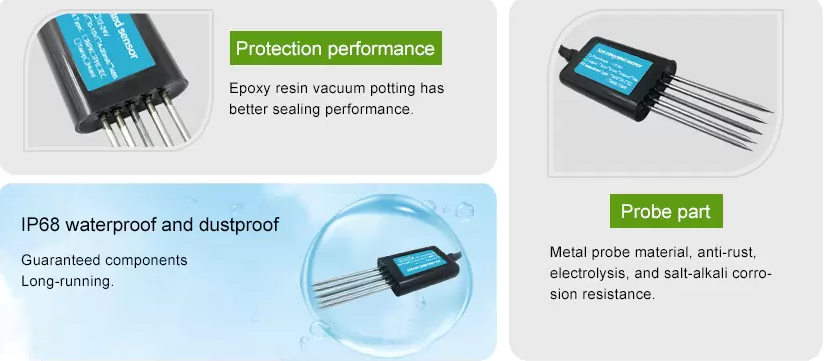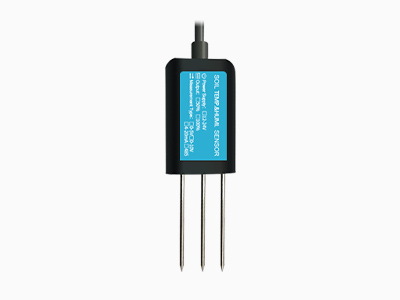In this article, we’ll explore the advances and benefits of soil moisture sensor, which have revolutionized the way farmers manage irrigation and conserve water. Because soil moisture plays a crucial role in agriculture. Soil water sensors affect plant water use efficiency and productivity. Accurate and effective monitoring of soil moisture levels is becoming more and more important to modern agricultural practices.

Importance of Soil Moisture Management:
Maintaining appropriate soil moisture levels is crucial for optimal plant health. Insufficient moisture can lead to drought stress, reduced yields, and poor crop quality. On the other hand, excessive moisture can cause waterlogging, nutrient leaching, and disease development. Precise management of soil moisture is therefore essential for sustainable agriculture.
Traditional Soil Moisture Monitoring:
Traditional methods such as manual observations and visual inspections are time-consuming, labor-intensive, and provide limited data points. Farmers often rely on personal experience and estimations, resulting in suboptimal irrigation practices. These methods lack the real-time data needed to make informed decisions regarding watering schedules and irrigation quantities.
Introduction of Soil Moisture Sensors:
Soil moisture sensor have emerged as game-changing tools that allow farmers to monitor soil moisture content accurately and efficiently. These sensors are designed to measure the volumetric water content in the soil, indicating the available water for plant uptake.
Working Principle of Soil Moisture Sensors:

There are various types of soil moisture sensor based on different technologies, including capacitance, time domain reflectometry (TDR), and gypsum block sensors. Capacitance sensors, the most commonly used type, measure soil moisture by evaluating changes in electrical conductivity.
Advantages of Soil Moisture Sensors:
a) Real-time Monitoring: Soil moisture sensors provide continuous and real-time data, enabling farmers to make immediate decisions based on accurate information.
b) Precision Irrigation: By monitoring soil moisture levels, farmers can apply water precisely when and where it is needed, optimizing water usage and minimizing waste.
c) Water Conservation: With the ability to monitor soil moisture accurately, farmers can avoid over-irrigation, resulting in significant water savings and conservation efforts.
d) Enhanced Crop Management: Soil moisture sensors help farmers identify irrigation patterns, water distribution variations, and potential drainage issues, leading to improved crop management practices.
Integration of Soil Moisture Sensors:
Modern soil moisture sensors can be integrated with advanced technologies such as wireless connectivity and data analytics. This integration allows for remote monitoring, data logging, and automated systems that adjust irrigation schedules based on real-time soil moisture data.
Challenges and Future Directions:
Although soil moisture sensors have proven their worth, there are still challenges to address, such as sensor calibration, installation depth, and sensor accuracy. Researchers and manufacturers continue to work on developing more robust, affordable, and user-friendly soil moisture sensors to meet the evolving needs of the agriculture industry.
Conclusion:
Soil moisture sensors have revolutionized agricultural practices by providing accurate, real-time data on soil moisture content. These sensors enable farmers to optimize irrigation, conserve water resources, and enhance crop management. As technology advances and costs decrease, soil moisture sensors will become increasingly accessible to farmers worldwide, contributing to sustainable and efficient agricultural practices.
